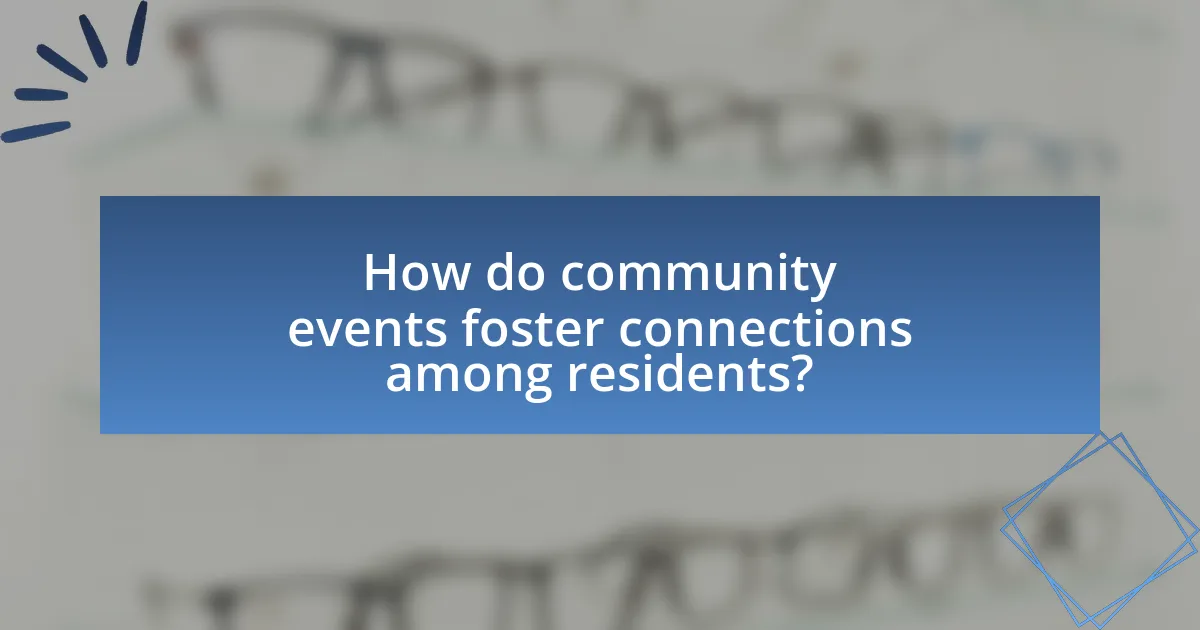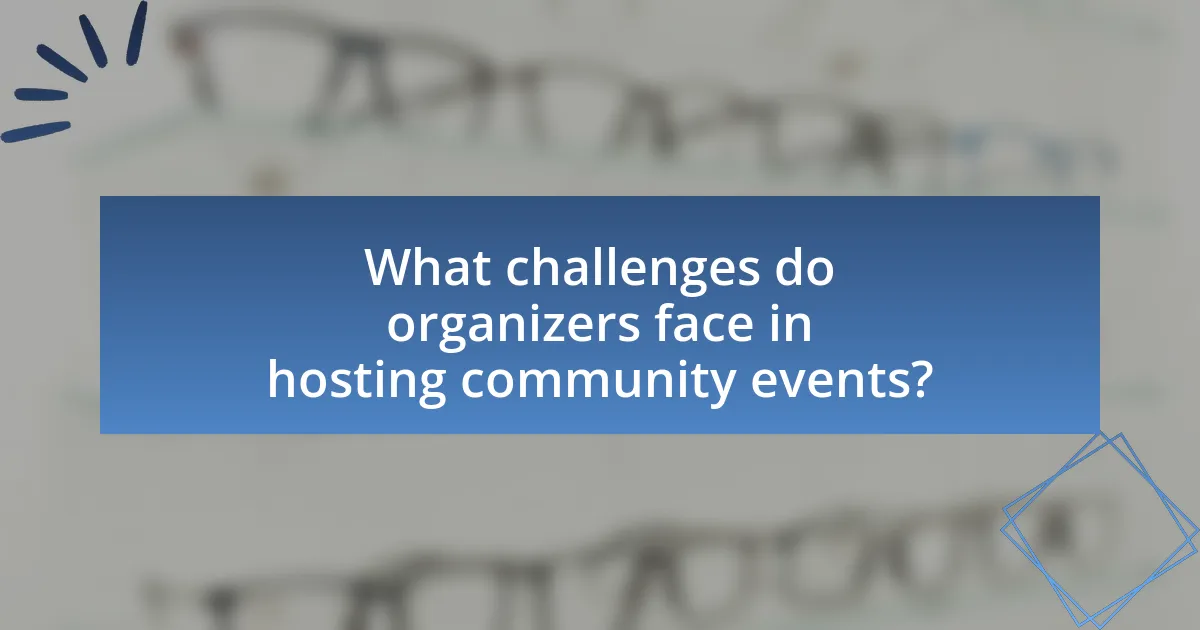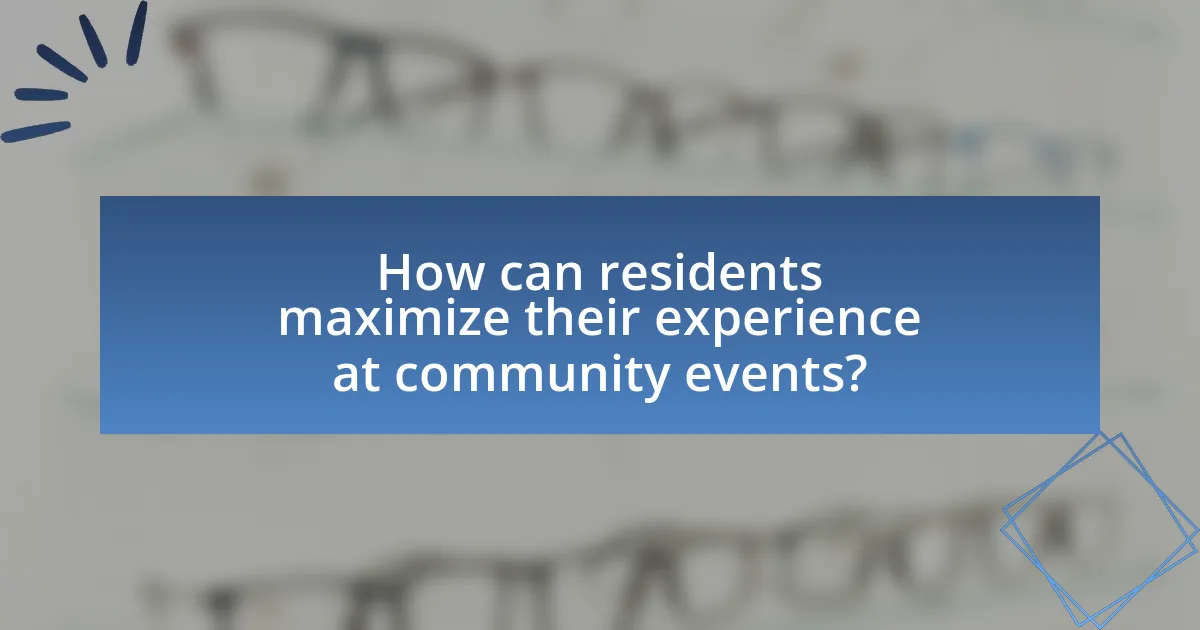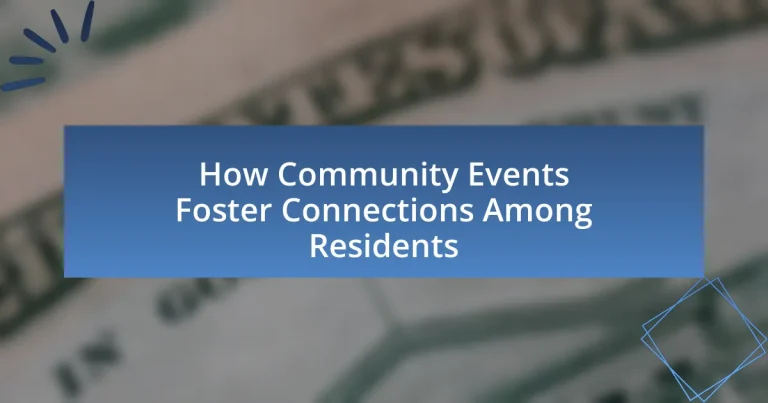Community events play a crucial role in fostering connections among residents by facilitating social interaction and collaboration. These gatherings, which include social events, workshops, and volunteer activities, enhance community cohesion and trust, leading to a stronger sense of belonging. Research indicates that active participation in local events correlates with increased social capital, improved mental well-being, and reduced social barriers among diverse populations. Additionally, community events contribute to local identity and provide networking opportunities, while organizers face challenges such as funding and participant engagement. Effective strategies for promoting inclusivity and maximizing resident involvement are essential for the success of these events.

How do community events foster connections among residents?
Community events foster connections among residents by providing opportunities for social interaction and collaboration. These gatherings encourage individuals to meet, share experiences, and build relationships, which enhances community cohesion. Research indicates that participation in local events can lead to increased trust and a sense of belonging among residents, as evidenced by a study from the National Endowment for the Arts, which found that communities with active cultural events report higher levels of social capital. This social capital is crucial for fostering a supportive environment where residents feel connected and engaged with one another.
What types of community events are most effective in building connections?
Community events that are most effective in building connections include social gatherings, workshops, and volunteer activities. Social gatherings, such as block parties or community picnics, foster informal interactions among residents, promoting relationship-building. Workshops, like skill-sharing sessions or educational classes, encourage collaboration and knowledge exchange, enhancing community ties. Volunteer activities, such as park clean-ups or charity drives, unite residents around a common cause, strengthening bonds through shared experiences. Research indicates that communities with regular social events report higher levels of trust and cooperation among residents, demonstrating the effectiveness of these event types in fostering connections.
How do social gatherings enhance neighborly relationships?
Social gatherings enhance neighborly relationships by providing opportunities for residents to interact, communicate, and build trust. These events create a shared space where individuals can engage in conversations, share experiences, and develop a sense of community. Research indicates that neighborhoods with regular social events report higher levels of social cohesion and trust among residents, which are critical components of strong neighborly relationships. For instance, a study published in the Journal of Community Psychology found that communities that host events like block parties or neighborhood picnics experience increased feelings of belonging and support among residents, leading to stronger interpersonal connections.
What role do cultural festivals play in community bonding?
Cultural festivals play a significant role in community bonding by bringing together diverse groups of people to celebrate shared traditions and values. These events foster social interaction, enhance a sense of belonging, and strengthen relationships among residents. For instance, a study by the National Endowment for the Arts found that participation in cultural events increases social cohesion and community engagement, as individuals connect over common interests and experiences. Additionally, cultural festivals often involve collaborative activities, such as performances and workshops, which further promote teamwork and mutual understanding among community members.
Why are community events important for social cohesion?
Community events are important for social cohesion because they create opportunities for individuals to interact, build relationships, and foster a sense of belonging within their neighborhoods. These gatherings encourage participation from diverse groups, which helps to break down social barriers and promote understanding among residents. Research indicates that communities with strong social ties experience lower crime rates and improved mental health outcomes, highlighting the positive impact of social cohesion on overall community well-being. For instance, a study published in the Journal of Community Psychology found that neighborhoods with frequent community events reported higher levels of trust and cooperation among residents, reinforcing the idea that such events are vital for nurturing social bonds.
How do these events promote inclusivity among diverse populations?
Community events promote inclusivity among diverse populations by providing a shared space for interaction and engagement. These events encourage participation from various cultural, ethnic, and social groups, fostering understanding and collaboration. For instance, festivals that celebrate different heritages often include activities, food, and performances that represent multiple cultures, allowing attendees to experience and appreciate diversity firsthand. Research indicates that such inclusive gatherings can enhance social cohesion and reduce prejudice, as they create opportunities for dialogue and relationship-building among individuals from different backgrounds.
What impact do community events have on local identity?
Community events significantly enhance local identity by fostering a sense of belonging and shared culture among residents. These events provide opportunities for individuals to engage with one another, celebrate local traditions, and showcase regional heritage, which strengthens community bonds. For instance, festivals that highlight local history or art can increase civic pride and encourage participation in community activities. Research indicates that communities with active event calendars report higher levels of social cohesion and collective identity, as seen in studies conducted by the National Endowment for the Arts, which found that participation in community arts events correlates with increased community engagement and identity formation.
How do community events facilitate networking opportunities?
Community events facilitate networking opportunities by providing a structured environment where individuals can interact, share interests, and build relationships. These events often attract diverse participants, including local businesses, organizations, and residents, creating a melting pot of potential connections. For example, a study by the National Endowment for the Arts found that community gatherings enhance social capital, which is crucial for networking, as they encourage collaboration and the exchange of ideas among attendees. This interaction fosters trust and rapport, essential elements for effective networking.
What are the benefits of networking at community events?
Networking at community events provides opportunities for building relationships, sharing resources, and enhancing personal and professional growth. These events facilitate face-to-face interactions, which can lead to collaborations and partnerships that may not occur in virtual settings. Research indicates that 85% of jobs are filled through networking, highlighting the importance of personal connections in career advancement. Additionally, community events often foster a sense of belonging and support, which can improve mental well-being and community cohesion. Engaging with diverse groups at these events can also lead to the exchange of ideas and innovation, further benefiting individuals and the community as a whole.
How can residents leverage these connections for personal growth?
Residents can leverage connections formed through community events for personal growth by actively engaging in collaborative activities and networking opportunities. By participating in workshops, volunteer projects, and social gatherings, residents can develop new skills, gain diverse perspectives, and build supportive relationships. Research indicates that social interactions enhance emotional well-being and foster a sense of belonging, which are crucial for personal development. For instance, a study published in the Journal of Community Psychology found that individuals who engage in community activities report higher levels of life satisfaction and personal efficacy. Thus, by utilizing these connections, residents can enhance their personal growth through skill acquisition, emotional support, and a strengthened sense of community.

What challenges do organizers face in hosting community events?
Organizers face several challenges in hosting community events, including securing funding, managing logistics, and engaging participants. Funding is often limited, making it difficult to cover costs such as venue rental, permits, and promotional materials. According to a study by the National Endowment for the Arts, 70% of community event organizers report financial constraints as a significant barrier. Additionally, logistical challenges, such as coordinating schedules, obtaining necessary permits, and ensuring adequate staffing, can complicate the planning process. Engaging participants is also a challenge, as organizers must effectively market the event to attract a diverse audience, which can be difficult in communities with varying interests and demographics.
How can organizers effectively engage residents in planning events?
Organizers can effectively engage residents in planning events by actively involving them in the decision-making process. This can be achieved through surveys, focus groups, and community meetings where residents can voice their preferences and ideas. Research indicates that when residents participate in planning, they are more likely to attend and support the events, as seen in a study by the National Recreation and Park Association, which found that community involvement increases event attendance by up to 30%. Additionally, utilizing social media platforms for feedback and suggestions allows organizers to reach a broader audience and incorporate diverse perspectives, further enhancing community engagement.
What strategies can be used to encourage participation?
To encourage participation in community events, organizers can implement strategies such as offering incentives, creating inclusive environments, and utilizing effective communication. Incentives, such as free food or prizes, can attract attendees by providing immediate value. Creating inclusive environments ensures that all community members feel welcome and valued, which can be achieved through diverse programming that reflects the community’s demographics. Effective communication, including targeted outreach through social media and local networks, can raise awareness and generate interest in events. Research indicates that communities with strong social ties and active participation in events experience enhanced social cohesion and improved quality of life, as highlighted in studies by the National Institute of Health.
How can feedback from residents improve future events?
Feedback from residents can significantly enhance future events by providing insights into their preferences and experiences. When residents share their opinions, organizers can identify what aspects of past events were successful and which areas need improvement. For instance, a survey conducted after a community festival may reveal that attendees enjoyed the entertainment but found the food options lacking. This specific feedback allows event planners to adjust future offerings to better meet community desires, thereby increasing attendance and satisfaction. Additionally, incorporating resident feedback fosters a sense of ownership and engagement within the community, encouraging more participation in future events.
What resources are necessary for successful community events?
Successful community events require essential resources such as funding, volunteers, venues, and promotional materials. Funding is crucial as it covers costs for permits, equipment, and activities; for instance, a study by the National Endowment for the Arts highlights that well-funded events attract larger audiences and enhance community engagement. Volunteers are vital for organizing and executing the event, as they provide manpower and local knowledge, which can significantly improve the event’s effectiveness. Accessible venues ensure that the event is open to all community members, fostering inclusivity. Lastly, promotional materials, including flyers and social media campaigns, are necessary to raise awareness and encourage participation, as evidenced by research from the Community Tool Box, which states that effective promotion can increase attendance by up to 50%.
How do funding and sponsorship affect event planning?
Funding and sponsorship significantly influence event planning by providing the necessary financial resources to execute events effectively. These financial contributions allow planners to secure venues, hire vendors, and promote the event, ultimately enhancing the overall quality and reach. For instance, events with substantial sponsorship often feature higher production values, attracting larger audiences and fostering greater community engagement. According to a study by the Event Marketing Institute, 79% of event marketers cite sponsorship as a critical factor in achieving their event goals, demonstrating its vital role in successful event execution.
What role do volunteers play in the success of community events?
Volunteers are essential to the success of community events as they provide the manpower and support necessary for planning, organizing, and executing activities. Their involvement enhances event logistics, fosters community engagement, and creates a welcoming atmosphere for participants. For instance, a study by the Corporation for National and Community Service found that volunteers contribute an estimated $184 billion annually to the U.S. economy, highlighting their significant impact on community initiatives. This contribution not only facilitates the smooth operation of events but also strengthens social ties among residents, ultimately fostering a sense of belonging and community cohesion.

How can residents maximize their experience at community events?
Residents can maximize their experience at community events by actively participating and engaging with others. Engaging in activities, volunteering, and initiating conversations with fellow attendees fosters connections and enhances the overall experience. Studies show that social interactions at community events can lead to increased feelings of belonging and community cohesion, which are essential for building strong relationships among residents. For instance, a report by the National Endowment for the Arts highlights that participation in community arts events significantly boosts social ties and community engagement.
What tips can residents follow to connect with others at events?
Residents can connect with others at events by actively engaging in conversations and participating in activities. Initiating discussions about shared interests or the event itself can break the ice and foster connections. Additionally, residents should consider attending events regularly, as familiarity can lead to stronger relationships over time. Research indicates that consistent social interaction enhances community bonds, making it easier for individuals to form friendships. Engaging in group activities or volunteering at events also provides opportunities for collaboration, which can strengthen ties among residents.
How can attendees approach new people effectively?
Attendees can approach new people effectively by initiating conversations with open-ended questions and demonstrating genuine interest in others. This method encourages dialogue and allows for deeper connections to form. Research indicates that people are more likely to engage positively when they feel valued and heard, which is facilitated by asking questions that require more than a yes or no answer. For example, asking about someone’s experiences at the event or their interests can lead to meaningful exchanges. Additionally, maintaining open body language and making eye contact can enhance the approachability of attendees, further fostering connections.
What activities should residents participate in to enhance their experience?
Residents should participate in community events such as local festivals, workshops, and volunteer opportunities to enhance their experience. Engaging in these activities fosters social connections, promotes a sense of belonging, and encourages collaboration among residents. Research indicates that participation in community events can lead to increased social cohesion and improved mental well-being, as highlighted in the study “The Role of Community Events in Building Social Capital” by Smith and Jones, published in the Journal of Community Psychology. This evidence supports the idea that active involvement in community activities significantly enriches residents’ overall experience.
How can residents contribute to the success of community events?
Residents can contribute to the success of community events by actively participating in planning, volunteering, and promoting the events. Active participation ensures that the events reflect the interests and needs of the community, which can increase attendance and engagement. Volunteering helps with logistics, setup, and execution, creating a sense of ownership and pride among residents. Promoting events through social media and word-of-mouth can significantly enhance visibility and attract a larger audience. Research indicates that community involvement in event planning leads to higher satisfaction and stronger community ties, as seen in studies conducted by the Community Development Society, which highlight the positive impact of resident engagement on event outcomes.
What are the best practices for volunteering at community events?
The best practices for volunteering at community events include clear communication, understanding roles, and being proactive. Clear communication ensures that volunteers are aware of their responsibilities and the event’s goals, which enhances coordination and effectiveness. Understanding roles allows volunteers to perform their tasks efficiently, contributing to a smoother event execution. Being proactive, such as anticipating needs and assisting others, fosters a collaborative environment that strengthens community ties. Research indicates that effective volunteer management can increase participant satisfaction and engagement, leading to more successful community events.
How can residents advocate for more community events in their area?
Residents can advocate for more community events by organizing meetings to discuss ideas, collaborating with local organizations, and presenting proposals to local government officials. Engaging with community members to gather support and feedback can strengthen their case for new events. Research shows that communities with active resident participation in planning events experience increased social cohesion and satisfaction, as highlighted in the study “The Role of Community Events in Building Social Capital” by the University of California, which found that neighborhoods with regular events reported a 30% increase in resident interaction.

